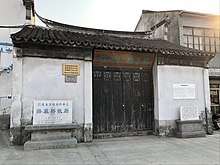Xue Muqiao
Xue Muqiao (Chinese: 薛暮桥; pinyin: Xuē Mùqiáo; 25 October 1904 – 22 July 2005) was a Chinese economist and politician. He was instrumental in introducing and implementing economic reforms that transformed China into a socialist market economy by participating in the development of the ideological concept of a primary stage of socialism.
Xue Muqiao | |
|---|---|
薛暮桥 | |
| Deputy Secretary of the Central Commission for Discipline Inspection | |
| In office November 1949 – 31 March 1955 Serving with Wang Congwu, An Ziwen, Qiang Ying, Liu Lantao, Xie Juezai, Li Baohua, Liu Jingfan, Liang Hua & Feng Naichao | |
| Personal details | |
| Born | 25 October 1904 Wuxi, Jiangsu, Qing China |
| Died | 22 July 2005 (aged 100) Beijing, China |
| Political party | Communist Party of China |

Xue was born in Wuxi, Jiangsu Province as Xue Yulin (薛雨林). He served as the director of National Bureau of Statistics of the People's Republic of China in 1950's. He was a fellow of Chinese Academy of Sciences. In 2005, Xue received the first Outstanding Achievement Award of Economics in China.
Xue Muqiao's theory of the "immature socialist system"
Xue Muqiao introduced the term "underdeveloped socialism" in his book China's Socialist Economy.[1] The book was written in the orthodox Marxist–Leninist framework enunciated by Joseph Stalin in Economic Problems of Socialism in the U.S.S.R. (1952).[2] Xue wrote that within the socialist mode of production there were several phases and for China to reach an advanced form of socialism it had to focus on developing the productive forces.[2] He proposed a theory in which the basic laws of economic growth were those in which "the relations of production must conform to the level of the productive forces".[2] Similar to Stalin, Xue considered the productive forces to be primary and that the relations of production had to conform to the level of the productive forces. Xue believed that this was a fundamental universal law of economics.[2] Unlike Stalin, Xue believed there were principles that guided the socialist transition, the key one being the principle of "from each according to his ability, to each according to his work"; this principle would guide socialist development, even when China had reached advanced socialism, and would be replaced with "from each according to his ability, to each according to his need" only when there existed general abundance.[3] Xue based his arguments upon the economic policies pursued during the Cultural Revolution, which he believed had led to "the most severe setbacks and heaviest losses suffered by the Party, the state and the people since the founding of the People's Republic".[3]
Xue believed the relations of production were determined by ownership in the economy.[3] He said that since the productive forces in China were "backward", the relations of production were at a comparable level.[4] While believing industry in China had become the "ownership of the whole people", Xue said agriculture was lagging far behind, which required ending the practice of paying wages based on collective efforts, supporting the re-introduction of individual incentives and increasing state investments in agriculture.[4] Xue's suggestions were abandoned at the 6th Plenary Session of the 11th Central Committee held in June 1981 because they failed to solve the problems facing agriculture.[5] From the 6th Plenary Session onwards, the CPC led by Wan Li began supporting the de-collectivization of agriculture.[5] At the beginning, Wan chose a conservative reformist approach, stating that:
Prudence is necessary when approaching the reform of the commune institutions. We should not require each level to reform from top to bottom by prescribing a time limit for fulfilment. Until suitable new organizational forms can replace production brigades and teams, we should not recklessly change existing forms and bring about a disorderly situation.[6]
Wan called for the dismantlement of the People's Commune system and its replacement with a household-responsibility system.[6] He referred to the changes underway in the agricultural system as the creation of a new mode of production and called it the socialist commodity economy.[6] Party theorist Du Runsheng supported Wan's position, saying, "a principle of Marxism is that every change in the relations of ownership is an inevitable outcome of the development of new productive forces which can no longer fit in with the old relations of ownership".[7] He also said:
Today's household undertakings are very different in nature. Since land is owned by the public, they are restricted by the collective economy in many ways. They represent a level of management in the co-operative economy, and constitute an organic component part of the entire socialist economy... It is feared that the household contracting system will promote the conservative idea of private possession among the peasants. This fear is not without grounds. However, we must be able to see the other side of the matter, which also happens to be the prevailing aspect. Today's peasants are different from those of the past. They are now new-type labourers under the socialist co-operative system.[7]
Notes and references
- McCarthy 1985, p. 142.
- McCarthy 1985, p. 143.
- McCarthy 1985, p. 144.
- McCarthy 1985, p. 145.
- McCarthy 1985, p. 146.
- McCarthy 1985, p. 147.
- McCarthy 1985, p. 148.